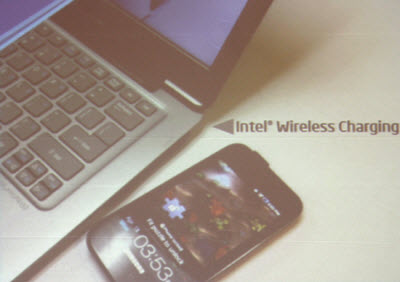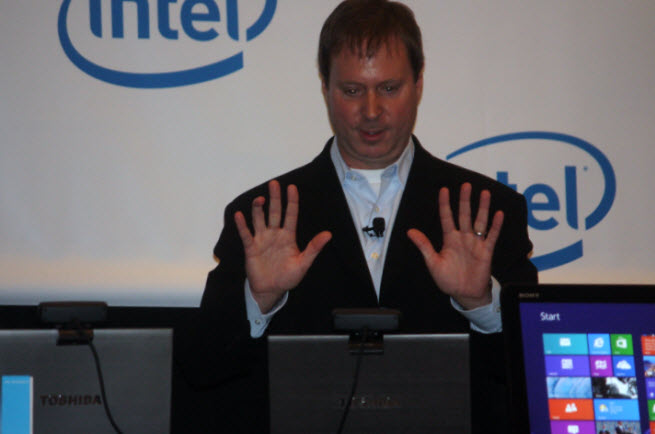SAN FRANCISCO — Intel executives are excited about the next refresh coming for the PC. Kirk Skaugen, the general manager of the PC Client business at Intel, said today at the Intel Developer Forum in San Francisco that “more innovation [is] coming in the next 18 months on the PC than you’ve seen in a decade.
 Skaugen, pictured above, said that Intel and IDT have teamed up to produce wireless charging for laptops and PCs, allowing you to charge a device such as a phone (pictured) simply by putting it near a PC.
Skaugen, pictured above, said that Intel and IDT have teamed up to produce wireless charging for laptops and PCs, allowing you to charge a device such as a phone (pictured) simply by putting it near a PC.
“Our goal is to eliminate wires from the PC,” Skaugen said.
The refresh is expected to begin on Oct. 26 with the launch of Windows 8, Microsoft’s new touch-oriented operating system, and continue through the next year or so. If it happens as expected, the refresh could generate $200 billion in annual sales for the computer industry.
Kevin Krewell, an analyst at The Lynley Group, said, “A lot of the innovation has to do with the new user interface, with touch, gesture and voice. All of the technologies have been around for a while. We are getting to a critical mass where people are used to touch and voice. The technologies are pervasive around us in things like Apple’s Siri. The PC is a natural place to incorporate those as well.”
He said the moves are clearly driven by concern that the PC is losing ground to tablets and smartphones. “Absolutely,” he said. “The whole platform development of Ultrabooks (thin and powerful laptops) is an attempt to mitigate the damage caused by tablets to the pc infrastructure.” But he doubts people will be excited about convertibles, which incorporate the tablet into a laptop.
Here’s the checklist of innovations coming for the personal computer:
- Windows 8 operating system with touchscreen controls. About 80 percent of people prefer touchscreens to other controls in tests by Intel, Skaugen said.
- Close-range depth tracking from a range of 6 inches to 3 feet, using SoftKinetics’ 10-finger recognition software and camera. Creative and SoftKinetic have created a camera that will debut in 2013 and eventually be built into a PC.
- All day battery life on a laptop.
- Voice recognition from Nuance. You can command your PC with your voice, dictate short sentences, and translate text to speech synthesis.
- 2D/3D augmented reality. Intel worked with Total Immersion to let you do things like try on a pair of sunglasses and see what they look like on your face, even if you’re doing it virtually via online shopping.
- Face analysis. A camera can recognize you and use that as your security password.
- A Perceptual Computing software development kit beta to enable developers to create new apps for the PC taking advantage of the above innovations.
- Intel’s fourth-generation Core microprocessor, code-named Haswell, will debut in the second half of 2013. It will have twice the computing power for the same amount of power consumption of today’s chips. A new version of the Core processors will operate in the range of 10 watts of power dissipation. That compares to 17 watts to 15 watts for Core processors today and 2 watts for Atom processors.
- In the next year, the number of Ultrabooks in the market will double from 70 today to more than 140.
- Convertible laptops, which will double as laptops or tablets, will debut in the near future.
- Better security, including anti-theft technology 2.0, which shows where your lost laptop is and hardware locks it if needed. Intel also has Identity Protection Technology so you can have a more secure social networking experience.
- Near-field communications. A short-range wireless technology allows for communication between a laptop and a mobile phone or tag.
- Support for the next-generation of high-definition video, with 4K resolution.
VentureBeat's mission is to be a digital town square for technical decision-makers to gain knowledge about transformative enterprise technology and transact. Learn More

